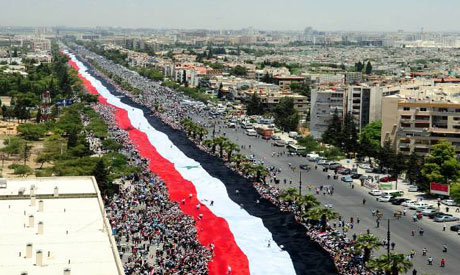
Syrian flag along the Highway in Damascus in this handout photograph released by Syria's national news agency SANA (Reuters)
Syria has launched a media offensive to counter the outcry over its deadly crackdown on dissent, escorting journalists to a hub of the protests and staging a loyalist rally.
Near the flashpoint northern town of Jisr Al-Shughur, officials Wednesday showed a group of 20 journalists, including an AFP correspondent, a grave containing at least five corpses said to be security forces.
The remains, which lay under a pile of rubbish, had been placed in yellow and orange body bags.
Bulldozers surrounded what state television identified as "a new mass grave," unearthed after the army took control of the town on Sunday.
The official SANA News Agency has reported that armed groups had mutilated the corpses of members of security forces in Jisr Al-Shughur. Human rights activists have said those killed were unarmed protesters.
They have also denied government reports of a massacre in Jisr Al-Shughur, saying bloodshed erupted during a mutiny by soldiers who refused to fire on the town's residents.
But government officials introduced journalists to a man who identified himself as a "gunman who participated in a massacre at the police headquarters," on 6 June. He said "armed men" had killed the victims.
Jisr Al-Shughur has been the focus of military operations since Friday. State television reported that Syrian troops had seized the town on Sunday after battling with "armed gangs" and "purging" the state hospital of armed groups.
On the outskirts of the capital, a large crowd of supporters of President Bashar Al-Assad demonstrated on Wednesday, waving national flags.
State television footage showed demonstrators lining a highway leading to the upscale west Damascus residential suburb of Mezze where a huge flag measuring 2.3 kilometres (1.4 miles) was unfurled.
The government's media offensive came in the face of mounting diplomatic pressure to halt its three-month crackdown on protests that have swept much of the country.
Neighbouring Turkey, which had cultivated close ties with Syria over the past decade, has toughened its stance against Assad's government. Prime Minister Recep Tayyip Erdogan last week accused it of perpetrating an "atrocity" against demonstrators.
Erdogan met Assad envoy Hassan Turkmani for nearly three hours Wednesday in an apparent fresh effort to persuade Damascus to change course. No statement was made after the Ankara talks.
The army assault on Jisr Al-Shughur and other towns and villages in Idlib province has sent thousands of people fleeing into Turkey. Witnesses said security forces had prevented residents leaving the province, shooting at people who tried to avoid military checkpoints.
Protesters have described the operation in the northern mountains as a scorched-earth campaign, while Syrian soldiers who deserted to Turkey have alleged they were forced to commit atrocities there.
According to figures released by the Syrian Observatory for Human Rights on Tuesday, violence has claimed the lives of 1,297 civilians and 340 security force members in Syria since mid-March.
Turkish Foreign Minister Ahmet Davutoglu travelled to the border region to monitor first-hand the humanitarian operation under way. He was seen visiting tents and chatting with refugees as he toured a fenced camp in Yayladagi town, kept off-limits to the media.
Earlier he had denied speculation that Turkey would stop accepting refugees once their numbers, already more than 8,500, hit the 10,000 mark. But he made it clear Turkey hoped Syria would launch reforms that would stem the tide.
UN Secretary General Ban Ki-moon again called on Assad to implement reforms, in a speech Wednesday. "These are moments of changes and hopes," he said. "Transformations that we might have not imagined in our lifetime are happening in the blink of an eye," he added.
He urged the Syrian authorities to "protect their people, respect their rights, listen to their voices ... create the conditions for refugees to return, implement reforms now before it is too late," he said.
The UN Human Rights Council urged Syria to let its investigators into the country. UN investigators already have a team in southern Turkey interviewing refugees.
Short link: